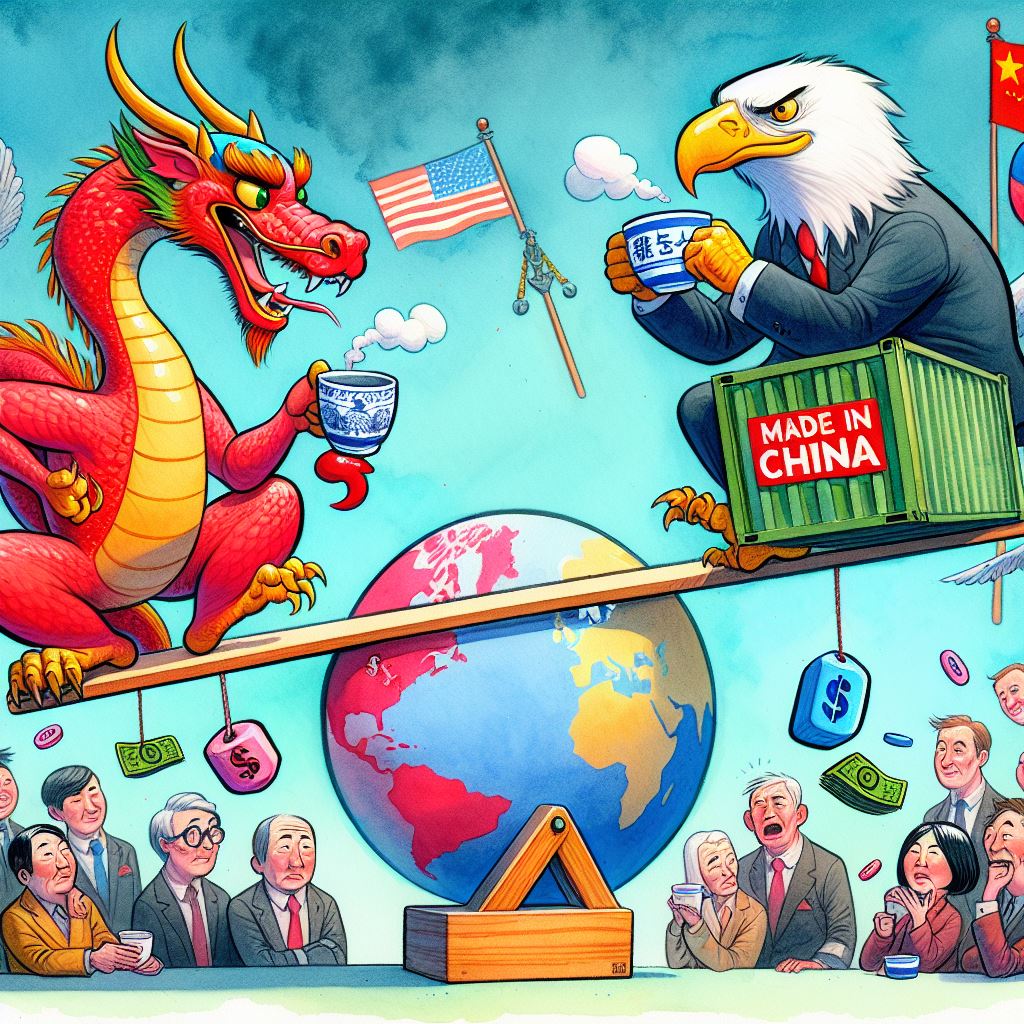In a twist that surprised precisely no one who has been paying attention to the pendulum swings of American trade policy, President Donald Trump announced a temporary moratorium on new punitive tariffs for all countries—with one notable, dragon-shaped exception. China, it seems, remains firmly in the presidential crosshairs, a distinction Beijing likely finds as flattering as a participation trophy at the Olympics.
Mutually Assured Commercial Destruction
The escalation of tariffs beyond 100% with China has produced exactly the results one might expect when waving a red flag at a bull while standing in a porcelain shop. The government of the People’s Republic has responded in kind, raising its own tariffs to levels that can only be described as “mathematically enthusiastic.” As of April 10, 2025, China has imposed an average tariff of 84% on imports from the United States—a staggering increase from the previous level of 34%. This retaliatory measure directly counters the U.S.’s recent escalation in tariffs on Chinese goods, which now exceed 100% in many categories.
This tit-for-tat escalation has effectively strangled bilateral trade flows. US Census Bureau data shows that American exports to China fell by 12.8% year-over-year in the most recent quarter, while imports from China declined by 18.3% over the same period. What remains are largely the essential goods for which no immediate substitutes exist—a situation more resembling economic hostage-taking than trade.
The Curious Case of “Win-Win”
The fundamental disconnect in this commercial chess match lies in the deceptively simple phrase “win-win.” In Western boardrooms, this charming idiom suggests mutually beneficial outcomes—the corporate equivalent of everyone getting ice cream. In Chinese negotiation tactics, however, the concept operates with distinctly different characteristics.
As any seasoned China hand will attest, the Chinese conception of “win-win” often translates to a sequencing where one party (typically not the foreign one) secures advantages now, while promising that the other’s victory lies somewhere in the indeterminate future, like a mirage that recedes as one approaches. There is also “win-lose,” where Chinese advantage was the intended outcome all along, and the more ominous “lose-lose,” where mutual destruction becomes the preferred alternative to unilateral concession.
By pushing tariffs to levels that effectively halt Chinese imports, the Trump administration has inadvertently selected Door Number Three, triggering a “lose-lose” response that has brought cross-border commerce to a grinding halt in both directions. Quarterly trade figures from the US Trade Representative’s office show a 23.5% year-over-year decline in total bilateral trade value—numbers that would make any economist wince.
The Authoritarian’s Dilemma
What the architects of America’s trade strategy appear not to have factored into their calculations is the peculiar nature of Chinese political imperatives. Unlike democracies, where leaders face voters every few years, China is governed by a relatively compact group whose primary objective is maintaining social stability—the golden ticket that preserves both their material privileges and legal exceptionalism.
As economic discontent rises domestically amid a property sector crisis and youth unemployment that officially hovers near 20% (and unofficially much higher), the Chinese leadership faces existential pressure. Their solution, borrowed from the authoritarian playbook first articulated by German political theorist Carl Schmitt in his Concept of the Political, is the designation of an external enemy.
By serving as China’s convenient villain, President Trump inadvertently provides Beijing with a scapegoat for domestic economic challenges—essentially gifting the Chinese Communist Party a “Get Out of Blame Free” card. Recent polling by the Carter Center shows that 67% of Chinese citizens now attribute their economic difficulties primarily to “foreign interference” rather than domestic policy failures—a narrative shift that solidifies rather than undermines regime stability.
Water Finds Its Level
The Chinese, not having faced genuine existential pressure since imperial Japan’s incursions, have demonstrated a remarkable capacity for strategic adaptation. Rather than engaging in direct confrontation with “Fortress USA,” Beijing has accelerated its diplomatic and economic outreach to both developing nations and European powers.
Evidence of this pivot is abundant: Chinese investment in the EU reached €7.9 billion in recent quarters, a 16.5% increase year-over-year according to Rhodium Group data. Meanwhile, the Belt and Road Initiative has pivoted toward higher-quality, lower-volume investments in strategic sectors throughout the Global South, with a particular focus on digital infrastructure and renewable energy—areas where American competition remains inconsistent.
As martial arts philosopher (and decidedly not political economist) Bruce Lee famously observed: “Be like water, my friend.” China’s approach embodies this principle perfectly, finding paths of least resistance around obstacles rather than futilely attempting to smash through them. The Trump administration’s bilateral fixation fails to account for this fluidity, leaving America punching at shadows while China’s influence seeps into previously overlooked crevices of the global economy.
No Exit Strategy
The fundamental question hanging over this commercial confrontation is where, precisely, it leads. The moratorium for other nations suggests at least a partial recognition that unlimited trade hostilities might not be sustainable, but the continued exceptionalism for China indicates a dangerous commitment to brinkmanship.
The problem with games of chicken is that they require one party to swerve. Authoritarian systems, unconstrained by electoral pressures or quarterly earnings reports, have historically demonstrated greater tolerance for short-term pain in service of long-term positional advantage. With Xi Jinping now effectively president-for-life, his time horizon for strategic planning extends considerably further than that of his American counterpart.
As Washington contemplates its next move, it might be worth recalling another Chinese strategic maxim, this one attributed to Sun Tzu: “Build your opponent a golden bridge to retreat across.” Unless such a face-saving off-ramp materializes soon, both nations appear locked in a commercial death spiral from which neither can easily extricate themselves—and in which the concept of “winning” becomes increasingly theoretical.

President | S.J. Grand Financial & Tax Advisory
Latest Articles:
- China’s New AI Labeling Rules Take Effect: A Step Toward Transparent AI Content
- Shanghai Launches Maternity Leave Subsidy to Support Working Mothers
- The Complete Guide to Sourcing from China: Your Path to Business Success
- Amendments to China Anti-Unfair Competition Law 2025
- China’s R&D Super Deduction Policy






